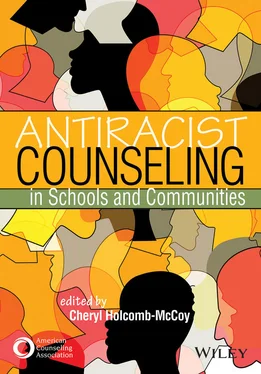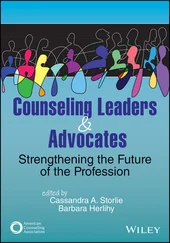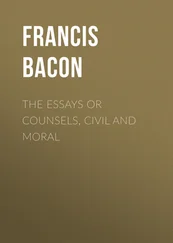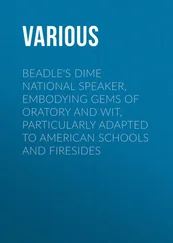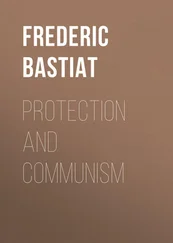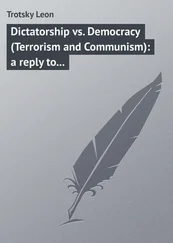Psychological tests were devised and interpreted to demonstrate that not only were Blacks intellectually inferior to Europeans but that they were particularly suited to perform manual labor, as if this pseudoscience had as its purpose providing a scientific basis for slavery and peonage. (p. xii)
A fundamental starting point in reimagining the helping profession, then, requires appreciating how European standards and whiteness are veiled and universalized throughout the counseling profession (Cushman, 1996; Katz, 1985; Marsella, 2015). This reimagining is a process that requires a critical awareness not only of the innocuous and systemic presence of white supremacy within the field of counseling but also of how the white imagination, invested in maintaining the Manichean dialect, is impervious to rhetoric and pedagogical interventions (e.g., antiracist training, unconscious bias training; Wilderson, 2010).
Part of this interrogation means revealing how the hegemony of Western thought was operationalized in counseling and psychology’s fundamental ideological bedrock to naturalize and then codify common sense about the non-beingness of Blackness and how the Black stands outside of humanity (Guthrie, 2004). As countless literary critics and social scientists have pointed out, many of the espoused values of the United States (e.g., meritocracy) came by drawing a definitive line of demarcation between the formerly enslaved Black subject and the disenfranchised white settler. This understanding is indispensable to our departure from the colonial and imperialistic origins of oppression and the helping professions.
Articulating Departures From the Colonial Counseling Canon
Many analyses of European enlightenment often begin by critiquing the veracity of objective claims to knowledge construction about categories and discourses of social difference derived from Western episteme. This critique is important because Western episteme was crucial in justifying the violence that constructed the New World. This is important because these social categories (Black/non-Black) are the consequence of colonialism and power dynamics in this country rather than objective truths obtained through the institutionalized methods of Western empirical science. As Smith (2015) astutely pointed out, frameworks of multiculturalism (e.g., respect for difference and diversity that do not undertake analyses of structural position seriously) and liberal ideas of social justice, which claim to ameliorate forms of cultural and social exclusion Black people encounter, are often rooted in deficit-based social reform programs predicated on the notion of preexisting forms of Black cultural pathology (e.g., mentoring programs, social-emotional learning, standards of mind-sets and behavior).
When contemplating a departure from the counseling canon, we would be remiss not to ponder the words of James Baldwin (1962): “Not everything that is faced can be changed; but nothing can be changed until it is faced” (p. T11). The school counseling profession, a microcosm of America and broadly the Western world, perpetually avoids reckoning with its role in maintaining systemic racism. This avoidance creates incongruence between avowed values and tangible actions across the profession that is observed systemically and individually. For Black counselor educators who embody a critical standpoint, navigating incongruent landscapes in various spaces creates an internal twoness that illuminates the inconsistencies within oneself and throughout the profession (Du Bois, 1903/2015). Sometimes, in an attempt to reconcile these feelings while in this struggle, the desire to influence change within inherently racist spaces (i.e., counseling, higher education, K–12 schools; Arredondo et al., 2020; Watkins, 2001; Wilder, 2013) becomes paramount. This existential meaningless is compounded by the unspoken expectation that we rely on the very scientific discourses that problematized Blackness to achieve self-affirmation, professional acceptance, or professional recognition.
This conundrum is typified in Audre Lorde’s (1984) insightful articulation “the master’s tools will never dismantle the master’s house” (p. 110). Although Lorde’s aspiration to deconstruct the master’s house resonates, feeling disempowerment to intervene in interrupting the structural nature of anti-Blackness is disheartening. Holding this awareness while attempting to create a community where future school counselors can authentically grapple with how they perceive themselves and the history of the profession represents a daunting challenge (Singh et al., 2010). To dismantle racism in the world, our profession, and our schools, individuals must first have critical awareness and then commit to a journey of internal transformation. More important, having a critical awareness of the systemic presence of racism within the field of school counseling builds a space to (a) understand how racism and white supremacy are reproduced and what interrupting this reproduction requires and (b) anticipate and navigate roadblocks that derail progress.
Counselor educators, school counselors, and school counselors-in-training are encouraged to adopt a lifelong critical self-awareness whereby they continuously reflect on their own bias, worldview, and positionality (Ratts et al., 2016). Holcomb-McCoy’s (2004) checklist provides a useful tool for engaging in this reflective practice. Aimed at the white school counselors who dominate the field (American School Counselor Association, 2020; Mitcham-Smith, 2007), Holcomb-McCoy’s tool offers a comprehensive set of prompts that allows one to critically self-reflect their whiteness and other layers of their social status (e.g., class), their awareness of racism, and their potential to counsel Black and Brown students. Exploration of oneself is a foundational practice in producing systemic change. When speaking of the threat of whiteness, Bettina Love (2019) stated the following:
Whiteness cannot enter spaces focused on abolitionist teaching. Whiteness is addicted to centering itself, addicted to attention, and making everyone feel guilty for working toward its elimination. Whiteness will never allow true solidarity to take place. Those who cling to their Whiteness cannot participate in abolitionist teaching because they are a distraction, are unproductive, and will undermine freedom at every step, sometimes in the name of social justice. Being an abolitionist means you are ready to lose something, you are ready to let go of your privilege, you are ready to be in solidarity with dark people by recognizing your Whiteness in dark spaces, recognizing how it can take up space if unchecked, using your Whiteness in White spaces to advocate for and with dark people. And you understand that your White privilege allows you to take risks that dark people cannot take in the fight for educational justice. (p. 159)
Although Love speaks of abolitionist teaching, her observations are applicable for all who engage with Black students in educational settings. Whiteness permeates the psyche and influences thoughts and behaviors and should be interrogated and challenged (Malott & Paone, 2011). School counselors of color should also engage in ongoing reflection. Like the teachers represented in Kohli’s (2014) research examining how teachers of color actively work to develop racially just classrooms, school counselors of color would benefit from engaging in critical self-awareness work to combat internalized racism that may cause them to support white supremacy ideologies, policies, and practices.
Some of the ideas and practices upheld by the school counseling profession perpetuate white supremacy and systematically harm Black students. Such ideas include theories like social-emotional learning (Griffin et al., 2020; King-White & Kurt, 2019) and grit (Duckworth et al., 2007). Social-emotional learning is influenced by Eurocentric norms and justifies the draconian disciplining of Black and Brown students (Kaler-Jones, 2020; Love, 2019). These tools are not different from the American School Counselor Association’s (2014) Mindsets and Behaviors for Student Success . This tool provides “35 mindset and behavior standards to identify and prioritize the specific attitudes, knowledge, and skills students should be able to demonstrate as a result of a school counseling program” (p. 1). Although the mind-set and behavior standards are informed by college and career readiness scholarship and other empirical studies exploring how students learn, there is little acknowledgment that this literature centers whiteness and provides student self-management and social skills dispositions where success can theoretically be achieved through respectability (Love, 2019; Morris, 2016). Success, conceptualized this way, ignores how oppression constrains one’s capacity to be successful and further romanticizes the Western myth of meritocracy (Bell, 2002). For example, the self-management skill “demonstrate the ability to overcome barriers to learning” places the responsibility on the Black or Brown student to overcome racist structures and practices like standardized tests (Au, 2016), disproportionately funded schools (Vaught, 2009), and overpolicing (Morris, 2016; Washington & Henfield, 2018). In addition, social skills like “use effective oral and written communication skills and listening skills” can be used subjectively to elevate students who speak standard English but subjugate students who do not speak English as their first language or who use culturally specific vernacular that is stereotyped as ignorant or less intelligent by the dominant culture (general dishonor). These skills do not hold racist school leaders, policies, and structures responsible for creating and maintaining toxic spaces for Black students to navigate.
Читать дальше
